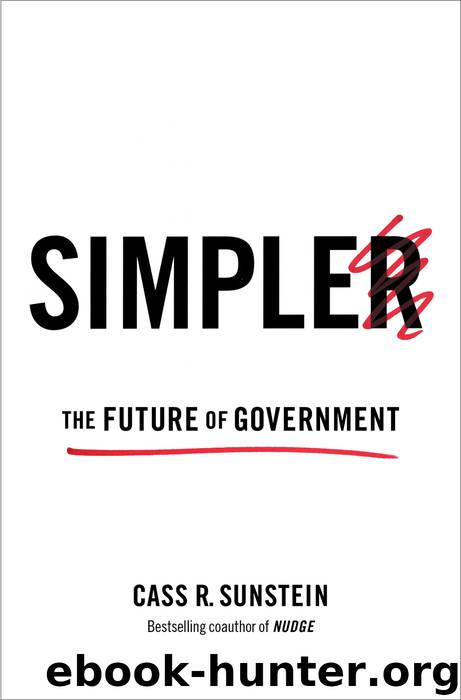Simpler by Cass R. Sunstein

Author:Cass R. Sunstein
Language: eng
Format: epub
Publisher: Simon & Schuster
Learning from Sugar Man
Consider in this light Searching for Sugar Man, a stunning documentary about an unsuccessful Detroit singer-songwriter named Sixto Rodriguez, who released two long-forgotten albums in the early 1970s. Almost no one bought them, and his label dropped him. Rodriguez stopped making records and worked in construction and as a demolition man.
What Rodriguez did not know was that he had become a spectacular success in South Africa—a giant, a legend, comparable to Elvis Presley and bigger than the Beatles and the Rolling Stones. Describing him as “the soundtrack to our lives,” South Africans bought hundreds of thousands of copies of his albums. Searching for Sugar Man is about the contrast between the failed career of Detroit’s obscure demolition man and the renown of South Africa’s mysterious rock icon.
The film is easily taken as a real-world fairy tale, barely believable, the kind of story that gives new meaning to the phrase “You couldn’t make this up.” But it is a bit less extraordinary than it seems, and it offers a profound lesson not only for music but for business, politics, and government as well.
Here’s the lesson, in a nutshell: Social dynamics—who is conveying enthusiasm to whom, and how loudly, and where, and exactly when—can separate the rock icon from the demolition man, and mark the line between stunning success and crashing failure. Social dynamics made Rodriguez in South Africa and broke him in the United States. Plenty of hit movies, chart-topping songs, and bestsellers, made possible by bandwagon or cascade effects, could easily have switched places with flops that you’ve never heard of.
Actually the implications are far broader than that. Simple and apparently small nudges, growing out of an appreciation of the power of social influences, can make a big difference. During the 2010 congressional races, certain Facebook users received a social message, a clickable “I voted,” including six pictures of randomly selected Facebook friends who had previously clicked that “I voted” button.21 Presented with those pictures, people were more likely to vote—and as a result of the experiment, hundreds of thousands of Americans ended up voting who would not otherwise have done so. We could easily imagine a parallel experiment with the message “I didn’t vote,” and it would almost certainly depress voting. In fact, we could easily imagine many influential clickable messages on social media (“I bought a fuel-efficient vehicle,” or “I stopped smoking,” or “I love the Chicago Bears,” or “I bought a Sixto Rodriguez CD”).
Successful entrepreneurs, social movements, and politicians benefit from the same dynamics that produce best-selling albums. Franklin Delano Roosevelt and Ronald Reagan were immensely talented and appealing, but countless people voted and worked for them only because they saw that other people were doing so. Other immensely talented and appealing politicians go nowhere, only because they fail to catch an early wave. Science fiction’s “parallel worlds,” exploring how differently history might have turned out, are not as far-fetched as they seem.
True, we can always try to reclaim inevitability by generating after-the-fact explanations of both success and failure.
Download
This site does not store any files on its server. We only index and link to content provided by other sites. Please contact the content providers to delete copyright contents if any and email us, we'll remove relevant links or contents immediately.
| Elections & Political Process | Ideologies & Doctrines |
| International & World Politics | Political Science |
| Public Affairs & Policy | Specific Topics |
| United States |
The Secret History by Donna Tartt(18056)
The Social Justice Warrior Handbook by Lisa De Pasquale(11930)
Thirteen Reasons Why by Jay Asher(8399)
This Is How You Lose Her by Junot Diaz(6401)
Weapons of Math Destruction by Cathy O'Neil(5779)
Zero to One by Peter Thiel(5444)
Beartown by Fredrik Backman(5293)
The Myth of the Strong Leader by Archie Brown(5204)
The Fire Next Time by James Baldwin(4986)
How Democracies Die by Steven Levitsky & Daniel Ziblatt(4932)
Promise Me, Dad by Joe Biden(4890)
Stone's Rules by Roger Stone(4818)
100 Deadly Skills by Clint Emerson(4647)
Rise and Kill First by Ronen Bergman(4527)
A Higher Loyalty: Truth, Lies, and Leadership by James Comey(4520)
The David Icke Guide to the Global Conspiracy (and how to end it) by David Icke(4348)
Secrecy World by Jake Bernstein(4342)
The Farm by Tom Rob Smith(4294)
The Doomsday Machine by Daniel Ellsberg(4220)
